Sean Gailmard is the Judith E. Gruber Associate Professor in the Charles and Louise Travers Department of Political Science at the University of California, Berkeley. John W. Patty is associate professor of political science at Washington University in St. Louis.
The University of Chicago Press, Chicago 60637
The University of Chicago Press, Ltd., London
2013 by The University of Chicago
All rights reserved. Published 2013.
Printed in the United States of America
22 21 20 19 18 17 16 15 14 13 1 2 3 4 5
ISBN-13: 978-0-226-92440-3 (cloth)
ISBN-13: 978-0-226-92441-0 (paper)
ISBN-13: 978-0-226-92442-7 (e-book)
Library of Congress Cataloging-in-Publication Data
Gailmard, Sean.
Learning while governing : expertise and accountability in the executive branch / Sean Gailmard and John W. Patty.
pages. cm.(Chicago studies in American politics)
ISBN-13: 978-0-226-92440-3 (cloth : alk. paper)
ISBN-10: 0-226-92440-8 (cloth : alk. paper)
ISBN-13: 978-0-226-92441-0 (pbk : alk. paper)
ISBN-10: 0-226-92441-6 (pbk : alk. paper)
[etc.]
1. Executive departmentsUnited States. 2. Government accountabilityUnited States. 3. Civil serviceUnited States I. Patty, John W. II. Title. III. Series: Chicago studies in American politics.
JK681.G355 2013
352.3'50973dc23 2012019397

This paper meets the requirements of ANSI/NISO Z39.48-1992 (Permanence of Paper).
Learning While Governing
Expertise and Accountability in the Executive Branch
Sean Gailmard and John W. Patty
THE UNIVERSITY OF CHICAGO PRESS CHICAGO AND LONDON
CHICAGO STUDIES IN AMERICAN POLITICS
A series edited by Benjamin I. Page, Susan Herbst, Lawrence R. Jacobs, and James Druckman
ALSO IN THE SERIES:
Electing Judges: The Surprising Effects of Campaigning on Judicial Legitimacy
by James L. Gibson
Follow the Leader? How Voters Respond to Politicians Policies and Performance
by Gabriel S. Lenz
The Submerged State: How Invisible Government Policies Undermine American Democracy
by Suzanne Mettler
Disciplining the Poor: Neoliberal Paternalism and the Persistent Power of Race
by Joe Soss, Richard C. Fording, and Sanford F. Schram
Why Parties? A Second Look
by John H. Aldrich
News That Matters: Television and American Opinion, Updated Edition
by Shanto Iyengar and Donald R. Kinder
Selling Fear: Counterterrorism, the Media, and Public Opinion
by Brigitte L. Nacos, Yaeli Bloch-Elkon, and Robert Y. Shapiro
Obamas Race: The 2008 Election and the Dream of a Post-Racial America
by Michael Tesler and David O. Sears
Filibustering: A Political History of Obstruction in the House and Senate
by Gregory Koger
In Time of War: Understanding American Public Opinion from World War II to Iraq
by Adam J. Berinisky
Us Against Them: Ethnocentric Foundations of American Opinion
by Donald R. Kinder and Cindy D. Kam
The Partisan Sort: How Liberals Became Democrats and Conservatives Became Republicans
by Matthew Levendusky
Democracy at Risk: How Terrorist Threats Affect the Public
by Jennifer L. Merolla and Elizabeth J. Zechmeister
Agendas and Instability in American Politics, Second Edition
by Frank R. Baumgartner and Bryan D. Jones
The Private Abuse of the Public Interest
by Lawrence D. Brown and Lawrence R. Jacobs
The Party Decides: Presidential Nominations Before and After Reform
by Marty Cohen, David Karol, Hans Noel, and John Zaller
Same Sex, Different Politics: Success and Failure in the Struggles over Gay Rights
by Gary Mucciaroni
We have incurred many debts in writing this manuscript, and since we can never fully discharge them, we will simply recount them in hopes that our creditors will let us off the hook.
Many friends and colleagues gave detailed and invaluable feedback on all or parts of the manuscript. For this help, we are grateful to Jim Alt, Tony Bertelli, Terri Bimes, Ethan Bueno de Mesquita, Torun Dewan, David Epstein, Justin Fox, Tom Hammond, William Howell, Greg Huber, Jeff Jenkins, Sid Milkis, Bill Resh, Evan Ringquist, Eric Schickler, Ken Shepsle, Erik Snowberg, Rob Van Houweling, Gordon Silverstein, and David Weimer. Dan Carpenter generously hosted a book workshop for us at Harvard Universitys Center for American Political Studies, and we owe an immense debt to the participants who offered feedback at the conference as well as in other venues: Dan, Sandy Gordon, Cathy Hafer, George Krause, Dave Lewis, and Matthew Stephenson. Jeff Jenkins kindly carved out space on the program at the University of Virginias conference on Congress and the presidency, and we are very grateful both to Jeff and our discussants, Chuck Cameron and Craig Volden, for their comments.
We received helpful critiques on parts of the manuscript from seminar audiences at Caltech, Indiana Universitys School of Public and Environmental Affairs, the London School of Economics, the Stanford Graduate School of Business, the University of CaliforniaBerkeley, the University of Chicago, the University of Esssex, the University of Southern California, the University of Wisconsin, and Yale University, as well as from participants at the first and second annual conferences on Political Economy and Public Law (Harvard and Chicago) and participants at several MPSA and APSA annual meetings. Much of the scheme that became this manuscript was hatched in various bars in the Palmer House Hilton, so numerous servers and bartenders share some of the credit or blame for the end result.
Working with the University of Chicago Press on this project has been a pleasure and a great help. We are grateful for the steady editorial hand of John Tryneski, who gave us excellent guidance and ample space to figure out what we were doing (or at least to try). Jamie Druckman, as a series editorial board member for Chicago Studies in American Politics, has been pivotal at every stage of this project, from submission of the first proposal to completion of the final version. We believe this book would not exist without his involvement, and his sharp insights on the content and overall argument have been immensely helpful in improving it.
Most importantly, we owe our greatest debts to our families. Our wives Gina and Maggie lent their ears as sounding boards for inchoate arguments, each in her own idiom, a task (all too) often most usefully rendered with a quizzical and nonplussed reaction indicating that an argument was well shy of half-baked. They and our childrenTeam Entropy (William, Aidan, and Collin) and Hazelalways helped us remember what its actually all about. We dedicate this manuscript to them.
Information is the lifeblood of executive branch action. Or at least, it is for effective action. At least three of the four virtues of executive action that Alexander Hamilton cited in Federalist 70unity, activity, secrecy, and dispatchpresuppose information to act. Information is also the bedrock of bureaucratic legitimacy in the United States. Bureaucratization is indisputably one of the most important developments in American government in the last hundred years, and information is its principal justification. Bureaucrats are elected by no one. They lack the measure of democratic pedigree that elected officials can claim. Most of the vast cadre of professional bureaucrats in Washington and around the country is not even appointed by anyone who is elected to office. Yet bureaucrats have the power to make policy decisions with the full force of law (even trumping, as far as federal bureaucrats are concerned, the decisions of duly elected state legislatures, thanks to judicial decree). What they do have, or are supposed to have, is information.

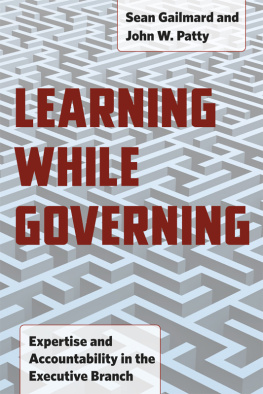
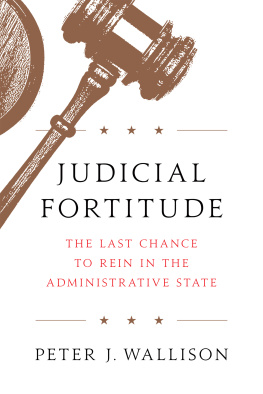
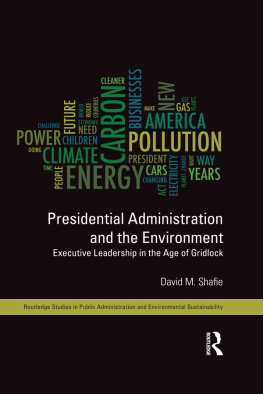

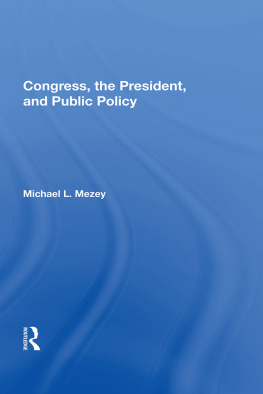
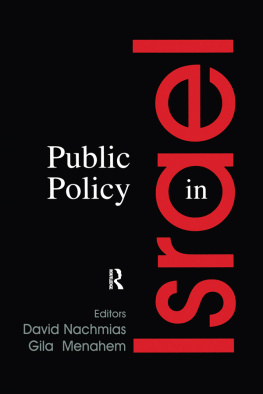
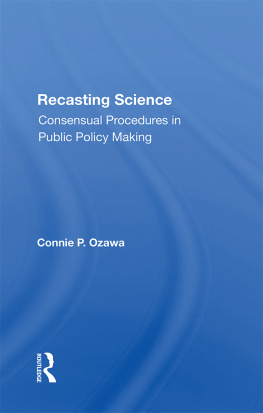
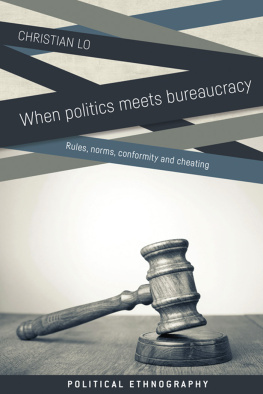
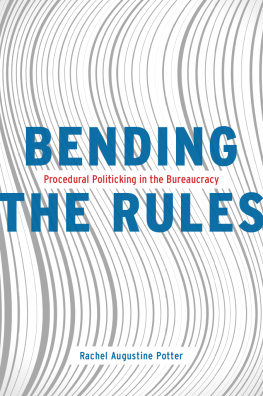
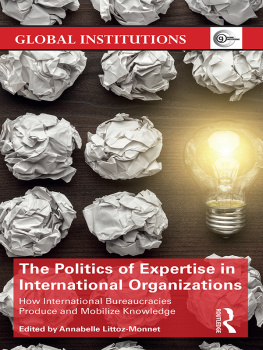
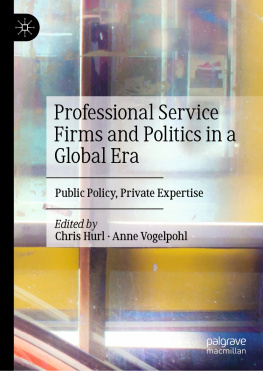
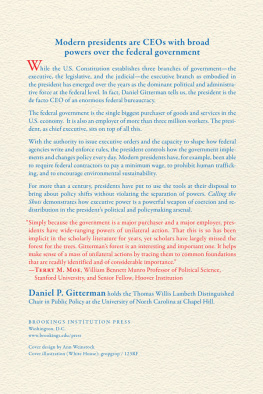
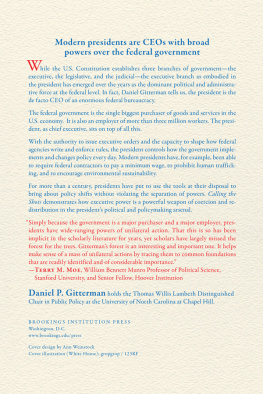
 This paper meets the requirements of ANSI/NISO Z39.48-1992 (Permanence of Paper).
This paper meets the requirements of ANSI/NISO Z39.48-1992 (Permanence of Paper).